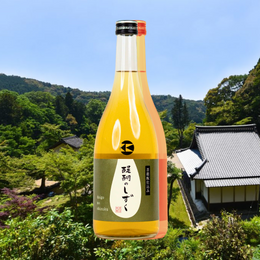
The Other Asahi-Shuzo
Asahi-Shuzo (not to be confused with the other Asahi Shuzo that produces Dassai sake) is a sake brewery that was established in 1830, and is located in Niigata prefecture, in the villa of Koshiji, amidst a beautiful natural climate of uncultivated woodland and rice fields. The Koshiji village is home to a rich cultural heritage and the beauty of the seasons that it experiences – from tea ceremonies in spring amid a backdrop of lush greenery, to ethereal fireflies in the summer, and to vibrant red maple leaves in the autumn season.

Asahi-Shuzo takes its ingredients and the rice it uses in sake production very seriously. So seriously, in fact, that in 1990 they established their own agricultural production company, known as Asahi Noken, to research new strains of rice, developing a close working relationship with local farmers to develop the ideal rice with the optimal qualities for sake brewing. Asahi-Shuzo produces sake made from different strains of sake rice under their different brands – Kubota, Senshin, and Esshu.
Today, we’re having a go at a sake from Asahi-Shuzo’s flagship brand Kubota – the Kubota Junmai Daiginjo.
The Flagship Brand - Kubota
Asahi-Shuzo’s Kubota label bears the original name of the brewery, and the brewery has stated their devotion to quality in sake brewing.
While Asahi-Shuzo does produce sake from a variety of different sake rice strains, the sake made under the Kubota label is a sake rice known as Gohyakumangoku – a signature sake rice that originates from the Niigata region. Gohyakumangoku rice produces sake that reflects the signature flavour profile of Niigata region sakes – light, clean, very refined, and with a smooth texture. (You can read more about the different major types of sake rice here.)


The Kubota brand houses a number of different sakes, ranging from subtle to fragrant aromas, and light to full-bodied. Based on the brewery’s own classification, the Kubota Junmai Daiginjo has a fragrant aroma and a medium body.

One of Kubota's unique characteristics is that their labels are printed on thoughtfully created and selected washi paper. Washi paper is a traditional craft paper product originating from over 1,300 years ago in ancient Japan, created from a blend of kozo wood (a type of hybrid mulberry bush). Many of Kubota's signature original labels are printed on and made from this beautiful washi paper.

We can evidently see the obvious difference in the label of the Kubota Junmai Daiginjo, with its drastically more modernized sleek and dark-coloured label which features the English transliteration and description of the sake. Asahi-Shuzo needed to find a way to compete with the other more modern alcoholic beverages such as gin that were coming into the Japanese market, and undertook a large re-branding exercise to give us this updated look of the Kubota Junmai Daiginjo. This seems to have worked, as the Kubota Junmai Daiginjo is among the most recognizable sakes from Japan, and can be accessibly found in many sake bars and izakayas.
Kubota Junmai Daiginjo Tasting Notes

Rice: Gohyakumangoku
Rice polishing: 50%
Nose: Aromatic florals with hints of pear
Taste: Well-balanced sweetness and mellow acidity that spreads deliciously on the tongue. The green fruit notes of pear from the aroma come through on the palate in a harmonious balance with notes of honey and melon.
Letting this sit for a while allows more of the fruity sweetness of the sake to come through and reveals more of the drink’s layers, with more of that honeydew melon sweetness coming to the forefront.

Body: Smooth and medium-bodied, this sake glides and spreads over the tongue, making for an easy and enjoyable sipping experience.
Pairings: This layered and aromatic sake with a medium body would complement and bring out the flavours of foods that are rich in protein with strong umami tastes – think cheese, grilled meats, grilled unagi!
My Thoughts
My Rating: ⚖️🍐❄️
A pleasantly well-balanced, smooth, and accessible Niigata sake at premium quality.
It seems that you really can't go wrong with the Kubota Junmai Daiginjo. This sake is often commonly featured at many izakaya bars, and is a great choice to order to pair with yakitori or wagyu kushi on your next night out.
The Kubota Junmai Daiginjo is also a great gateway to tasting Niigata sakes, capturing the region’s signature flavour profile and embodying its natural landscape, with its abundance of clear water, heavy snowfall, and cultivated premium quality rice.
Happy sipping!

@ChopstickPride







